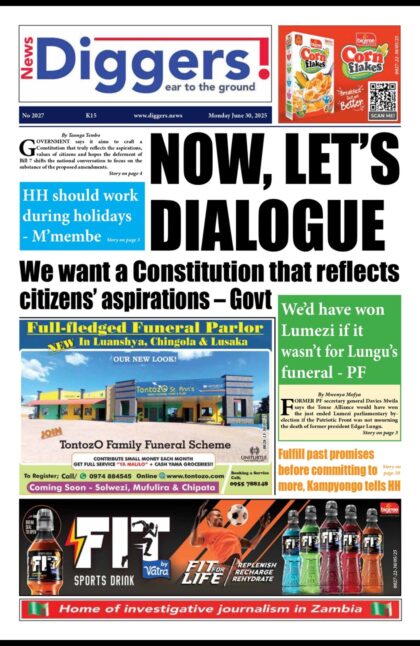FORMER Health Minister Dr Jonas Chanda says lack of operationalisation of the Zambia Medicines and Medical Supplies Agency (ZAMMSA) and debt owed to drugs suppliers are among factors which have led to the drug shortage in the country.
In an interview, Chanda wondered why ZAMMSA had not been procuring drugs despite being given the mandate.
“When you look at the reforms that were done in the health sector, there is a reason why Medical Stores Limited was transformed into ZAMMSA. From independence, we had Medical Stores Limited until when I became Minister of Health, I signed that commencement order to transform Medical Stores Limited into ZAMMSA. The whole reason for forming ZAMMSA, when you look at the ZAMMSA act, was to transfer functions from the Ministry of Health to that specialised body including the procurement. The challenges that have been at Ndeke House, for many years we had issues in terms of procurement. So when ZAMMSA came in, they are supposed to take over the procurement functions of the Ministry of Health so that those specialists at ZAMMSA are the ones doing the procurement. And a lot of investment has been done at ZAMMSA,” Dr Chanda said.
“The question is why hasn’t ZAMMSA started procuring despite the act being in place. The reason we transitioned from Medical Stores to ZAMMSA was exactly to move the procurement from Ndeke House, MoH to ZAMMSA. So, to me, the issue is, is ZAMMSA procuring? Have they ever procured any medicine? If we are being told that the past six months no procurement has been done, which means that ZAMMSA is not operationalised despite the act establishing them.”
He said at the moment, ZAMMSA and the procurement team at the Ministry of Health were paralysed.
“If you have no procurement team at Ndeke House, then who is procuring? Yes, procurement should be done by ZAMMSA but just in case…because I am told that their senior management has been sent on leave. So obviously there is no one who can do the work so ZAMMSA is paralysed, Ndeke House is also paralysed, there is no procurement team. So, in the end, no one can procure. If ZAMMSA has never been operationalised despite being established, then we have a very big challenge because the law is being broken, the ZAMMSA act is being broken,” he said.
Dr Chanda said the Ministry of Health should tell the nation how much debt the ministry was in.
“In terms of financing, how much money has been released to the Ministry of Health? Historically, the ministry is in debt. It has over K2.6 billion in debt and this debt can be broken down in a number of things; a lot of suppliers who are owed money, the covid supplies and the health care equipment, so people who do all these equipment are owed money. When you look at the debt portfolio of the ministry, it is huge. Even when they say that they released K200 million for the procurement of drugs, that is a drop in the ocean. Because that money will not go a long way to dismantle the debt,” Dr Chanda said.
“The Minister of Health and the PSs should be able to tell us how much debt the ministry has. The health sector has been chronically underfunded. So when you put all these factors together, they explain the drug shortages. And they explain why most of our equipments are not working because the people that are supposed to maintain that equipment are owed money. The most logical way is to put the debt portfolio on the table and plan how the suppliers will be paid.”
Meanwhile, Dr Chanda said the ministry should not be politicised by suggesting that cooperatives should be supplying drugs to the Ministry of Health.
“We should not politicise the health sector, we are talking about the lives of people, it is a matter of life and death. I heard someone saying cooperatives will start procuring, I think it will be the first time in the history of Zambia that cooperatives will start procuring drugs in a very sensitive ministry. I don’t know which law will be used. When you look at the ZAMMSA act, it is very clear on who is supposed to supply drugs. Otherwise, we are going to have the same problems that we have had in the past where every jim and jack is supplying. Are those cooperatives made of professional entities who are like ZAMMSA? They are not. So to me, that is shooting yourself in the foot, we will be lowering the standards in the health sector. Cheap is expensive,” said Dr Chanda.
“Cooperatives are mostly lay people, where will they be sourcing the drugs from? And do they have the capacity? If you follow a cheap way, you are going to incur very huge costs in the short term, both huge costs to the lives of people and huge costs in terms of wastage. So, we have the law on who is supposed to procure unless you say the ZAMMSA act has been abolished and the only body that can amend the ZAMMSA act is Parliament. As far as I know, Parliament has not changed the law and the President has not signed a new law where cooperatives are starting to buy. So, that is a very dangerous route to go. Procurement should be well controlled by government.”



















